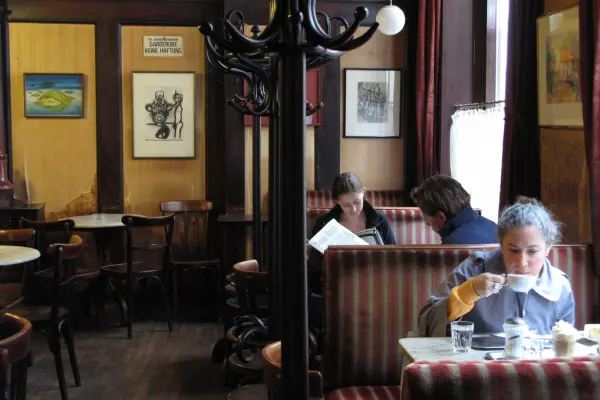The year 2000 was the embodiment of the future until it came to be the present. For decades people imagined what the world would look like when the year came.
Many thought the cartoon series, “The Jetsons” was a glimpse of the promised technology the future was sure to hold.
While technology has seen rapid growth and transformation around the world it is redefining art as evident by works featured in the Goethe-Institut China’s technology fair "A Better Version of You.”
The fair featuring exhibits from artists from around the world was on display in Beijing’s 798 Arts District on March 24 until April 1.
It provided a look into how art and technology have become so intertwined serving as the foundation of contemporary societies on a global scale.
Global perspectives
"A Better Version of You" Technology Fair in Beijing /Li Yinjun, Goethe-Institut China
“It gives people an insight in to what exists and what the implications of this are,” South African artist and participant Bogasi Sekhukhuni told CGTN Digital at the exhibit.
He is one of the 18 exhibitors who participated in the showcase.
For the duration of the nine-day exhibit, Beijing’s 798 district was transformed into a unique art exhibit that looked more like a trade show filled with innovative technology.
Sekhukhuni’s “NTU: Nervous Conditioner” which he created with Nolan Dennis and Tabita Rezaire was created as an “uncompromised” channel for people of color to discuss, share, and organize, without the presence of detractors like white-supremacists that populate public forums on the Internet.
Utilizing perspectives from China, South Korea, Japan, Russia, South Africa, Europe and the US, “A Better Version of You” showcased the latest advances in defining political and social technologies.
State of the art
"The Jetsons" cartoon premiered in 1962. / Hanna-Barbera
“Game I: Future is Fate” is the prototype of a game generated by artificial intelligence allowing users to explore their own identity based on an avatar created from the metadata that is amassed during the course of one’s life.
The exhibit piece, entitled “Omikuji” is bringing the fusion of art and technology to life. This live-stream event took place between Japan’s National Museum of Emerging Science and the Goethe exhibit.
“Humans want to believe science can tell them about the future,” artist participant Elena Knox told CGTN Digital.
"A Better Version of You" Technology Fair in Beijing / Li Yinjun, Goethe-Institut China
Knox is from the Department of Intermedia Art & Science at Waseda University in Japan.
She said that the AI technology, nicknamed Alter, is experimental AI that uses neural networks including deep belief networks through which machines determine certain inputs to be believable.
“Gender is a way humans learn to believe and is a way for us to classify and understand something as simple as 'the wink'," Knox said.
(CGTN)
 简体中文
简体中文

